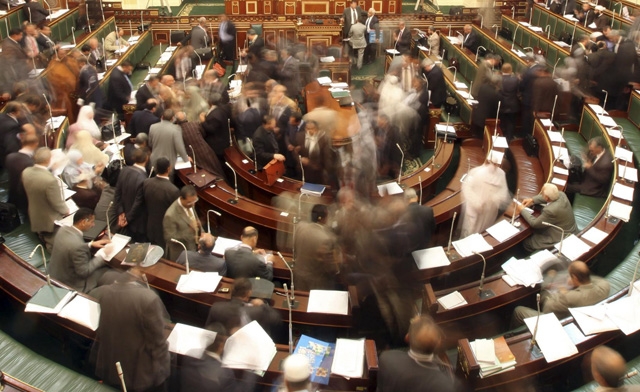
On April 10, the Administrative Court in Cairo ruled to stop the implementation of parliamentary speaker Saad al-Katatny’s formation of the constituent assembly in response to a number of lawsuits challenging the legitimacy and constitutionality of the highly controversial body. The lawsuit is just the latest blow the legitimacy of the assembly, which has seen at least twenty members resign over concerns that liberals and minorities are underrepresented on the 100-member body that will draft Egypt’s next constitution. Revolutionaries and campaigners celebrated the decision although it consists only of a preliminary injunction pending further judicial review. In issuing this ruling, the Court has in effect altered the course of the transition by practically forcing the presidential elections to take place before the drafting of the constitution, thus allowing the new president a significant role in the process, and by extension the future course of Egypt.
A number of respected lawyers, including Gad Nasser, professor of constitutional law at Cairo University, and Sameh Ashour, the head of the Lawyers’ Syndicate, challenged the constituent assembly selection process on the basis of a 1994 Supreme Constitutional Court decision that prohibited members of parliament from electing themselves – implying that the body can only consist of figures outside of the Shura Council and the People’s Assembly, meaning that the parliament’s decision to reserve 50 seats for its own members would be unlawful. Legal scholars praised the Court’s ruling, hoping that it might force the Islamist dominated parliament to choose members that represent Egypt’s diverse demographic rather than only its Islamic political current. Revolutionaries and liberal have also regained hope that the Supreme Council of the Armed Forces would return to the barracks and relinquish control over the constitutional drafting process to a civilian executive.
Abdel-Moneim Abdel-Maksoud, the Muslim Brotherhood’s lawyer, vowed to appeal the Court’s decision that he claims, “…was in breach of all established constitutional principles, and prevailing judicial norms.” By arguing that the formation of the constituent assembly remained a parliamentary action, and not an administrative decision, he feels confident that the Court of Appeals will invalidate the Administrative Court’s ruling. (Interestingly, Freedom and Justice Party (FJP) Chairman Dr. Mohamed Morsi expressed respect for the judicial suspension and denied claims that the FJP would challenge the ruling.) Although it remains unclear at this point whether the Muslim Brotherhood’s legal challenges on behalf of the parliament will reclaim their political advantage, the Supreme Constitutional Court seems the only judicial body that will ultimately settle the legal spat.
Barring a protracted legal battle, the resulting situation confronts parliament with a choice: either replace the parliamentarians on the constituent assembly with Muslim Brotherhood loyalists, or genuinely work with the full spectrum of scholars, civil society, workers’ representatives, and religious institutions to draft a fair, legitimate, and lasting constitution. Given, however, the that the Court has effectively ensured that a new president would take office first, the possibility of directing the terms governing the formation of the new assembly from the executive branch may induce the FJP to refocus its efforts on Khairat al-Shater’s presidential campaign. With a number of candidates that could potentially split the Islamist vote, this tactic would prove risky. Losing the election to an anti-Muslim Brotherhood candidate would certainly derail the full control that the FJP has enjoyed over the constitutional process.
It should be obvious to the Egyptian parliament that the welfare of the country as a whole must take precedence over party affiliations or political ambitions. Choosing a truly diverse membership for the constituent assembly not only supports a real democratic and representative foundation for the country that meets the demands of the revolution, but it would also sidestep the risk of a personality such as presidential candidate and former spy chief Omar Suleiman from usurping the process and choosing a course that satisfies neither the revolutionaries nor parliamentarians. For the FJP, it may even restore some of the legitimacy lost in the eyes of the public after breaking its promise not to field a presidential candidate.
Tarek Radwan is an Egyptian human rights activist specializing in international law and conflict resolution. He has worked for Human Rights Watch’s MENA division and the United Nations mission (UNAMID) in Darfur as a Human Rights Officer. He currently provides consulting services on civilian protection and Middle East issues.
Photo Credit: Al-Arabiya
Image: 640x392_25395_203520.jpg
